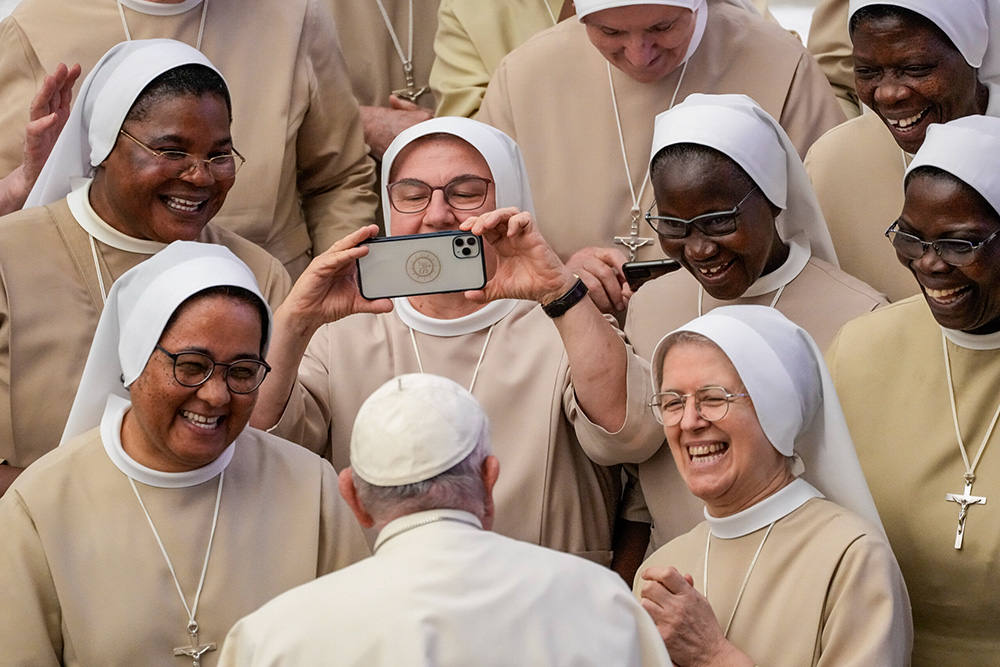
Pope Francis meets a group of nuns during his weekly general audience in the Pope Paul VI Hall at the Vatican, on Aug. 30, 2023. (AP/Andrew Medichini, File)
Noting that women are better managers than men, Pope Francis announced he is adding another woman to his administrative staff, naming Franciscan Sr. Raffaella Petrini to succeed retiring Spanish Cardinal Fernando Vérgez Alzaga as president of the Governatorate of Vatican City State.
She will be the second woman to head a curial office, joining Consolata Missionary Sr. Simona Brambilla, the new prefect of the Dicastery for Consecrated Life and Societies of Apostolic Life. Both are Italian-born, Rome-educated nuns who have served as the secretary or second in command of their respective Curia offices.
While the pope is acting on his desire to include women in administrative managerial positions in the church, he seems to have turned a deaf ear to calls for women in ministry, despite approving continued discussion about women deacons.
The stumbling block seems to be his view of women.
Meeting in November 2022 with senior staff of the Jesuit journal America, the pope argued, "That the woman does not enter into the ministerial life is not a deprivation."
He based his belief on the so-called "Petrine principle" of ministry and "Marian principle" of femininity proposed by the Swiss theologian and priest Hans Urs von Balthasar (1905-88), who resigned from the Society of Jesus in 1946 to found a secular institute with his fellow Swiss, Adrienne von Speyr, the Catholic convert and mystic.
Telling America, "The church is woman. The church is spouse," Francis suggested what he called "a third way: the administrative way."
Advertisement
He pointed to the women he added to the Vatican's Council for the Economy, which today has seven cardinals and six laypersons, of whom five are women. Continuing his thought, the pope said: "I wanted to highlight the two theological principles; the Petrine principle and the Marian principle that make up the church. Therefore, that the woman does not enter into the ministerial life is not a deprivation. No."
Speaking directly to America's executive editor, Kerry Weber, he said, "Your place is that which is much more important and which we have yet to develop, the catechesis about women in the way of the Marian principle."
Considered in light of some of Francis' other comments, which some call patronizing and bordering on misogynistic, one wonders how much his enunciated "Marian principle" will undermine his delegation of authority to Brambilla and Petrini. Can curial clerics work for women?
Petrini's new position is wholly administrative. Her oversight of the Vatican City State includes offices for personnel, civil records, archives, accounting, mail, police, tourism, museums, archaeological research and the Vatican Observatory. Her large portfolio does not appear to require clerical status, although each of her 10 predecessors was a cardinal.
Brambilla, on the other hand, heads a curial office overseeing religious orders and institutes of women and men, including priests. In theory, at least, she is responsible for approving new groups or the mergers of existing ones, as well as approving constitutions, transfers of members and ruling on the appeals of dismissed members. Because the dicastery's delegated authority extends to men's groups, some commentators call her appointment illegal.
Perhaps predicting that criticism, Francis named Salesian Cardinal Ángel Fernández Artime as pro-prefect. Presumably, he would sign paperwork applying to clerical groups or individual clerics.
The church is changing, some say growing. Adding women to its infrastructure should be only a first step. Francis says women are better managers than men. Can he not see — or is he afraid to say — that women might be better ministers as well?






